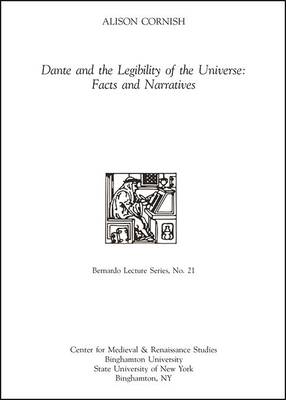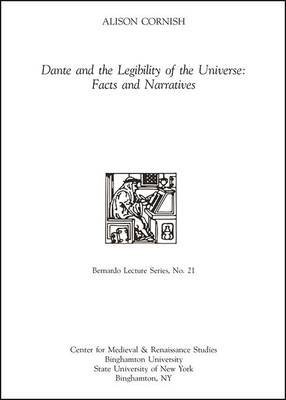
- Retrait gratuit dans votre magasin Club
- 7.000.000 titres dans notre catalogue
- Payer en toute sécurité
- Toujours un magasin près de chez vous
- Retrait gratuit dans votre magasin Club
- 7.000.0000 titres dans notre catalogue
- Payer en toute sécurité
- Toujours un magasin près de chez vous
Dante and the Legibility of the Universe: Facts and Narratives
Bernardo Lecture Series, No. 21
Alison CornishDescription
Argues that the Divine Comedy dramatizes the risks and rewards of competing narratives, or different ways of reading.
"Dante and the Legibility of the Universe: Facts and Narratives" is the twenty-first in a series of publications occasioned by the annual Bernardo Lecture at the Center for Medieval and Renaissance Studies (CEMERS) at Binghamton University. This series offers public lectures that have been given by distinguished medieval and Renaissance scholars on topics and figures representative of these two important historical, religious, and intellectual periods.
In these polarized times, we often accuse others or are accused by others of choosing facts to suit a particular narrative-a narrative of choice, as if one side had the narrative and the other, the facts. If the universe is a book, written in the language of mathematics, as Galileo says, or bound by love into a single volume, as Dante says at the very end of Paradiso, the ability to read or interpret data as part of a narrative proves a most essential skill and a very good reason for reading the Divine Comedy.
Spécifications
Parties prenantes
- Auteur(s) :
- Editeur:
Contenu
- Nombre de pages :
- 34
- Langue:
- Anglais
- Collection :
Caractéristiques
- EAN:
- 9781438486949
- Date de parution :
- 01-05-21
- Format:
- Livre broché
- Format numérique:
- Trade paperback (VS)
- Dimensions :
- 145 mm x 221 mm
- Poids :
- 45 g

Les avis
Nous publions uniquement les avis qui respectent les conditions requises. Consultez nos conditions pour les avis.






